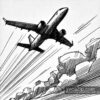narrow meaning
narrow :
not wide, limited
adjective
▪ The street is very narrow.
▪ The street is not wide.
▪ She has a narrow view of the topic.
▪ She has a limited view of the topic.
paraphrasing
▪ tight – not wide
▪ limited – not much space
▪ restricted – not wide
▪ confined – limited
narrow :
to make less wide, to limit
verb
▪ They will narrow the road.
▪ They will make the road less wide.
▪ We need to narrow our choices.
▪ We need to limit our choices.
paraphrasing
▪ reduce – to make less
▪ limit – to make smaller
▪ restrict – to make less wide
▪ contract – to make smaller
Pronunciation
narrow [ˈnær.oʊ]
The stress is on 'nar' and sounds like 'na-roh'.
Common phrases and grammar about narrow
narrow - Common meaning
adjective
not wide, limited
verb
to make less wide, to limit
Part of Speech Changes for "narrow"
▪ narrowness (noun) – the quality of being not wide
▪ narrowed (adjective) – made less wide
Common Expressions with "narrow"
▪ narrow down – to limit choices
▪ narrow escape – a close call
▪ narrow path – a not wide path
▪ narrow focus – a limited view
Important examples of narrow in TOEIC
Vocabulary examples from the TOEIC test
In TOEIC vocabulary questions, narrow often refers to making choices smaller or less wide.
Example of a confusing word: widen (to make wider)
Grammar examples from the TOEIC test
As a verb, narrow is often used in TOEIC questions to show action of making something less wide or limited.
narrow
Idioms and fixed expressions in TOEIC
narrow down
'limit choices', used when reducing options.
narrow escape
means 'a close call', used when someone avoids danger just in time.
Differences between similar words and narrow
narrow
,
restrict
differences
Narrow means to make less wide, while restrict means to limit or control something.
narrow
,
tighten
differences
Narrow means to make less wide, while tighten means to make more secure or firm.
Words with the same origin as narrow
The origin of narrow
The word narrow comes from Old English 'nearu', meaning 'of little width'.
Word structure
The analysis of the word's composition is unclear.
Words with the same origin
The word's root is unclear or difficult to confirm.
Please select an image in the quiz
Previous post and next post


dramatically
1756
suddenly, strikingly
adverb ┃
Views 4





